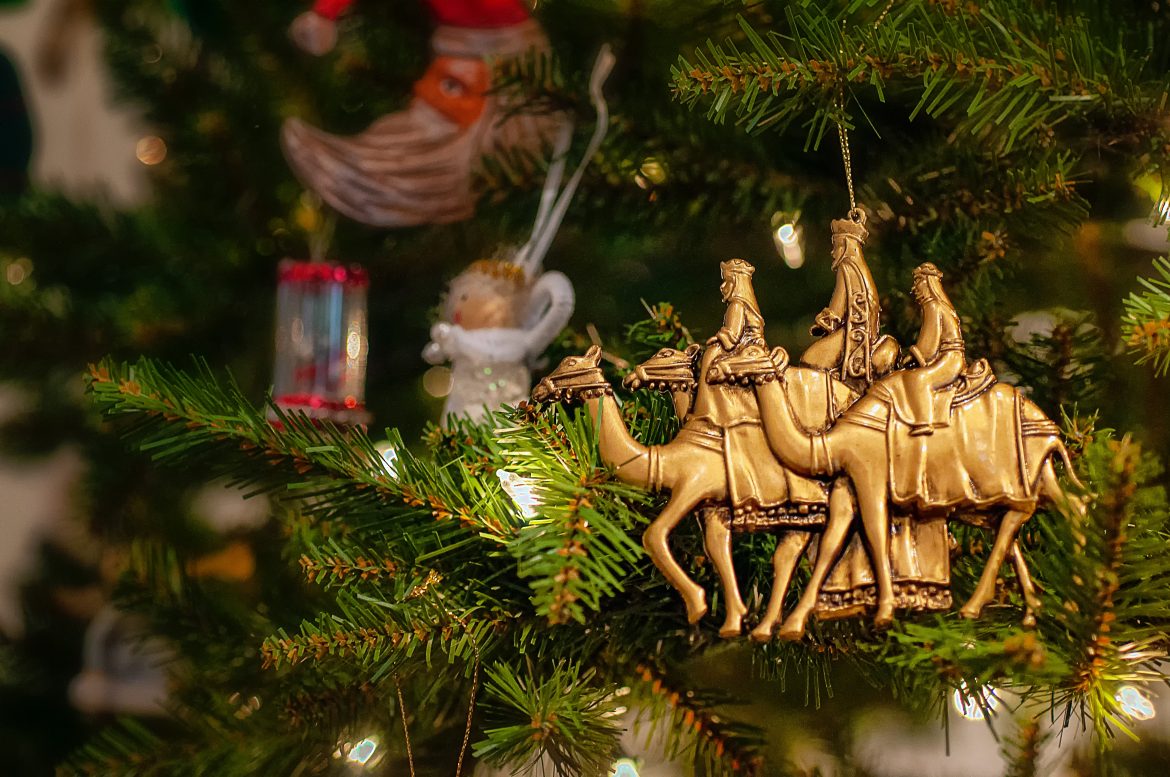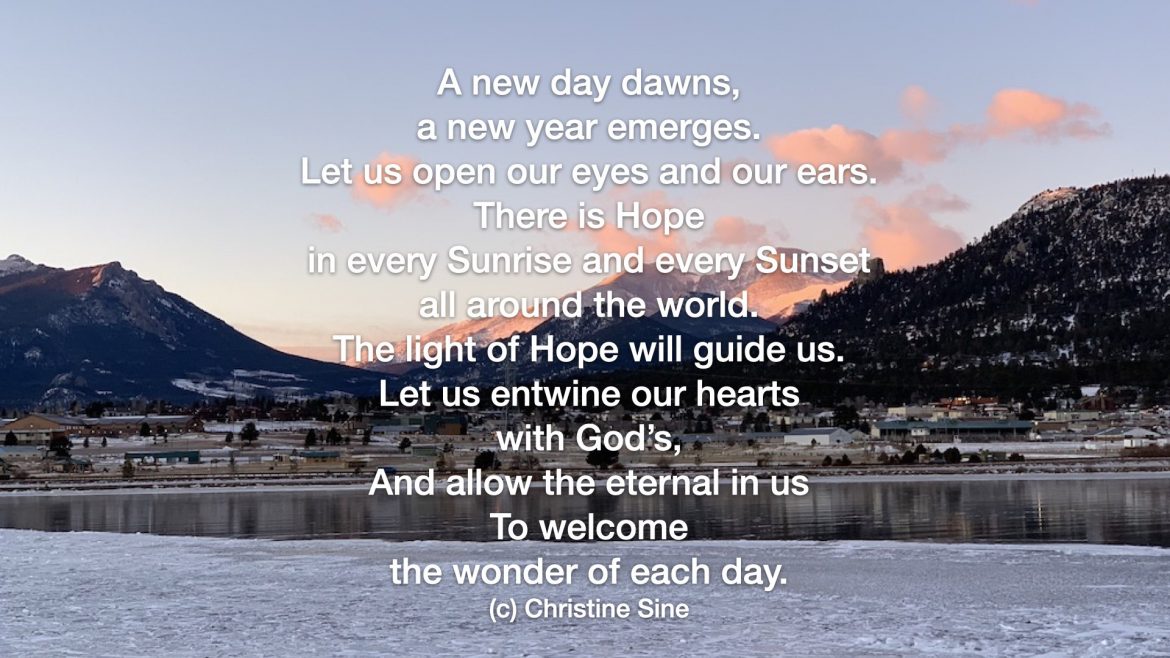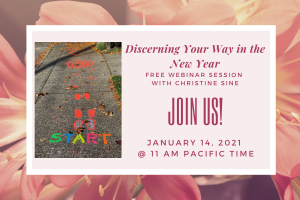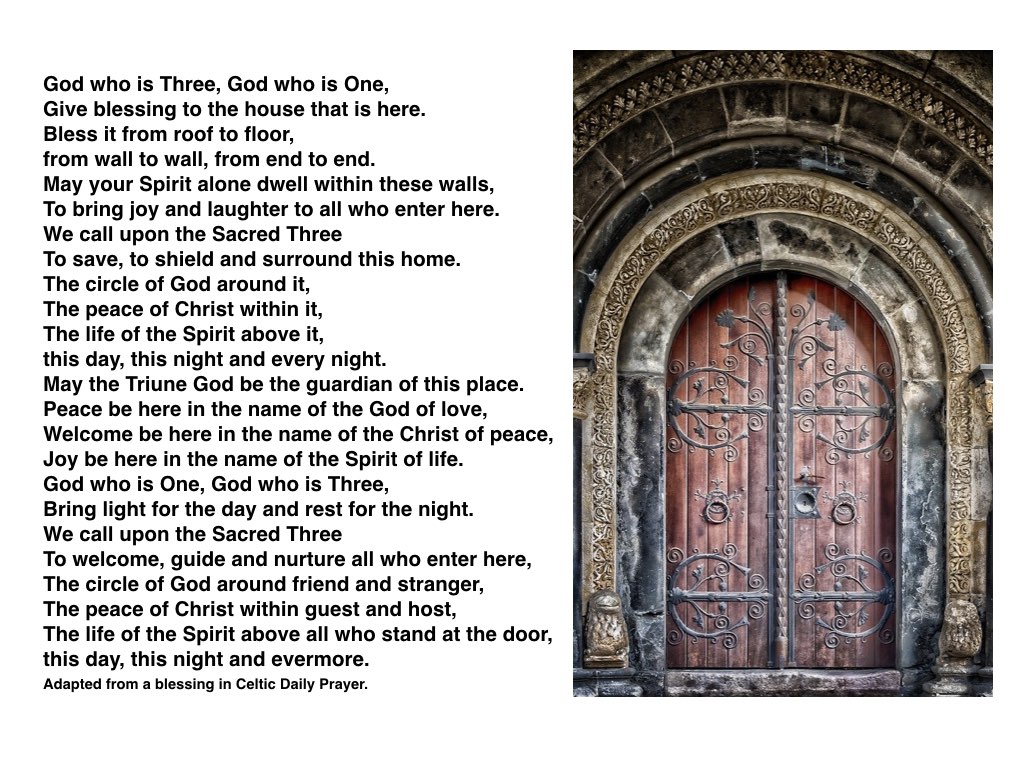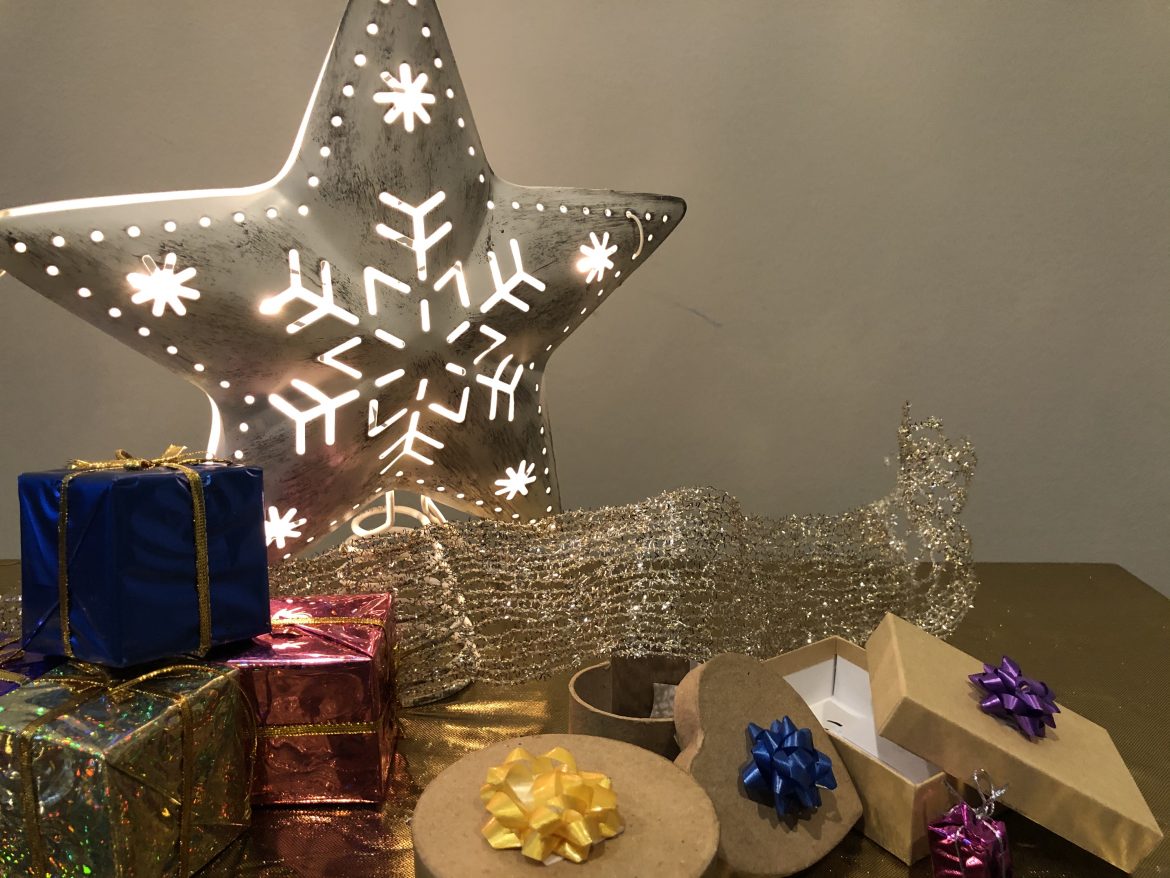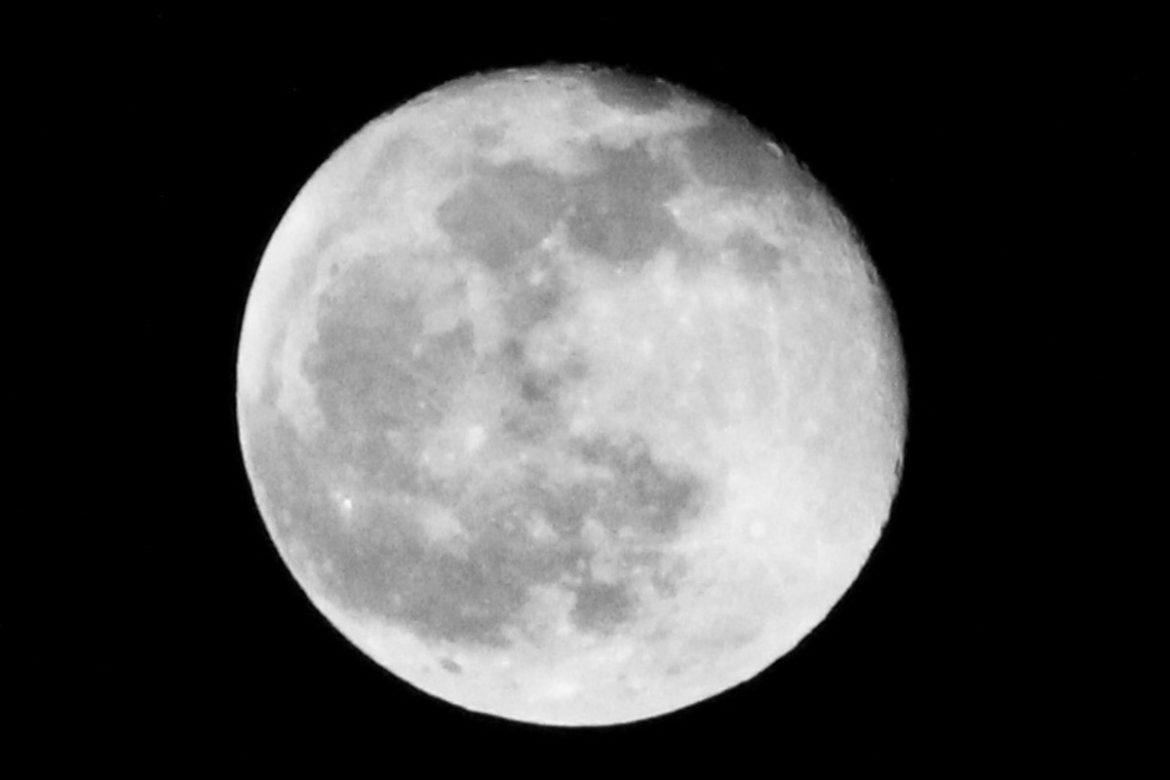Today is the day before Epiphany. The day before the church calendar celebrates the arrival of the Wise Men visiting Jesus. Some days before a big day are marked – like New Year’s Eve or Christmas Eve. But some days aren’t. The day just happens.
I wonder how those Wise Men felt on the night before they found this king they’d seen predicted in the stars. I’m thinking that on Epiphany Eve they were feeling a bit confused. They made their way to Herod’s palace and got a cryptic message from him as he tried to cover up for the fact that he didn’t know a king had been born in his province. I’m sure they were pondering their encounter with this man and his words. Herod, even though portrayed in church tradition, as a tyrant, was actually a great leader. He build extensively, not just palaces for himself, but aqueducts, theatres and public buildings, and generally raised the prosperity of the land. I think the Wise men would have been perplexed that this leader, who was well connected through the known world, did not know of this king that they had seen predicted in the stars that would change the course of history.
Not much is known about the backstory of the Wise men. No one knows for sure where they came from or what status they held in their own land. We don’t even know how many of them there were or how big a retinue they came with. All they get is a handful of verses in gospel of Matthew and one day in Anglican and Catholic church traditions to look into them.
Our church has a tradition associated with Epiphany where letters are chalked on the church door. Last year they read – 20+C+M+B+20. The initials C, M, B are for the traditional names of the Three Kings. Caspar, Melchior, and Balthazar, but also in Greek translation can stand for “Christus Mansionem Benedicat,” which means “May Christ bless this dwelling.” But it is a bit like a code. Until you are in with the “in crowd” you haven’t got a clue what those letters mean. But I think this is so relevant for the coming of the Wise men.
The Wise men weren’t part of the in crowd, either in the land of Palestine or within the Jewish tradition. They were as much outsiders as the shepherds. The shepherds were despised within their community but at least they knew how the community worked, whereas the Wise men, because of their wealth would have been viewed with respect and would have been honoured, but they were on the outside of something they did not understand. The person they had expected to support and lead them, Herod, had let them down and had sent them on their way with a vague description of where to go and what to expect, but had left them to it. They were camped at the end of a small nondescript town where Herod had sent them. I wonder how they felt?
So today, on Epiphany Eve, imaging being in your expensive Bedouin tent [imagine your equivalent of]. You’re with your friends but you’re not sure where you are going. You’re not at the place you expected to be. You also know it is one of those places where everyone knows everyone. You can tell that from looking at it. But the sign that brought you here, this big star, is still telling you this is the way walk in it. Personalise it and think about how many times you’ve stood on the edge of something you don’t quite know what it was but you know you have to keep pressing forward.
We are just five days into 2021 with the US about to enter a new presidency, the UK being out of Europe with the deal we have to now make work, with the vaccine being given to more and more people and things lifting but lockdowns continuing, not knowing what the world economy will look like and the East saying they’re doing alright. For many, there are exams and schooling to ponder how it will work out, babies being born, weddings happening, futures out there waiting to happen, but still there is waiting and not knowing, but we all have to walk forward.
As we didn’t know this time last year what this Covid virus would really mean to the world so the Wise men did not really know what awaited them in Bethlehem. But they followed, and they waited, and they arrived, and they gave their gifts, even though that must have seemed weird. But just for today they waited on the outskirts and pondered the journey they had been on and what their destination would look like. So at times, we also stand on the edge and wait and ponder but we must place our hand in God’s and keep on keeping on.
This poem seems more appropriate this year than it has for a long time:
“And I said to the man who stood at the gate of the year:
“Give me a light that I may tread safely into the unknown.”
And he replied:
“Go out into the darkness and put your hand into the Hand of God.
That shall be to you better than light and safer than a known way.”
So I went forth, and finding the Hand of God, trod gladly into the night.
And He led me towards the hills and the breaking of day in the lone East.”By Minnie Louise Haskins
So let us walk into the unknown, find God’s hand and walk gladly no matter what comes this year.
by Christine Sine
Many of us are entering the year with uncertainty about where we are headed. 2020 upended all our best laid plans and surfaced many of our insecurities. It exposed the vulnerabilities of our society and of the lives of many with whom we share the planet. So we enter 2021 feeling very unsure of ourselves.
This year, more than ever, I feel we need to spend time in discernment and seeking direction. We need the assurance that God is still with us and that in 2021, the divine presence will offer us a future of hope and promise. So how do we find that assurance and where do we think it will lead us in 2021?
Direction for a New Year
I don’t know about what you do, but my discernment process has tended to be fairly cerebral and I have always ended by setting concrete goals for the year. But if 2020 has taught me anything, it has shown me the importance of creativity and flexibility. Direction for 2021 is unlikely to lead towards concrete goals. I suspect that it is more likely to provide a framework of practices that enable me to journey safely with resilience, compassion and grace and I feel that has already begun with the writing of the prayer above which I plan to use over the next few weeks. It is providing the basis for a powerful centering exercise for me.
Tom and I are planning to take a day for discernment at the end of this week, and this year, creativity will be at the centre of my process.
I plan to begin by centering myself on the divine presence – in me, and around me. This year, I plan to use a new breathing exercise I am working on in partnership with the prayer above which came out of my breathing exercise reflection over the last couple of days. I will share this when I can but until then consider using this breathing exercise. You might prefer lectio divina or visio divina to focus your mind and your heart as you begin. Recognizing that we sit surrounded by and filled with the holy presence of God is a wonderful place to start. It is in this place of holy rest that we seek discernment.
Step 2 will be looking back. I will read through my journal and look through my photos from 2020 as I usually do, and have not only looked back in my journal but on Godspace, too. I have found this so helpful that I have put much of this looking back on Godspace into a new resource Guidelines for a Personal Retreat because I thought you might find the process helpful too.
Stirred by this reflective process, I realize that this year’s retreat needs to hold more creativity and flexibility than usual. At this point, I cannot choose between Lilly Lewin’s wonderful suggestions of using different coloured post-it notes to remind me of the high points and low points of the year, or Cindy Bunch’s idea of creating a compass which both looks back and forward or create a moodboard, suggested by Beth Stedman as a way to capture intentions and hopes for the year. A mood board is a type of poster that contains text, images, and samples of objects that serve as a visual tool for communicating ideas and creating inspiration. She explains “its prayer and contemplation through scissors and glue”. What I love about this tool is that it creates an artwork that can be displayed as a reminder throughout the year.
Step 3 will be looking forward. For this I will probably pull out both my doodling tools and my finger labyrinth, both tools that inspire creativity and mental resilience. They have the added advantage of encouraging me towards a journey rather than concrete goals.
Now don’t get me wrong, I already have several projects in the works for 2021 but I am aware, too, that 2020 has made me aware of how much more important people are than things. Relationships need to be a major priority for me, whether that mean more Zoom calls with family and friends or taking advantage of emerging face to face opportunities.
However, I am still excited about those projects I am working on, like the webinar next week, Discerning Your Way In The New Year, which will provide an opportunity for you to join me in a spiritual retreat process. If you are interested but cannot join at the time, register anyway as we will send a link afterwards so that you can access the webinar material.
I am also working on a new online course – Time to Heal – in conjunction with Lilly Lewin and others. This course will provide creative and contemplative tools that lead us towards healing within ourselves, our communities and God’s created world. I am really excited about this as I believe that 2021 will be a year of healing and feel that this is already the word God has given me as my focus for the year. I hope that you will join us in the process of healing, too, and we would appreciate your prayers. We hope to have this ready to launch during the season of Lent but that is not far away.
January is a time for dreaming, and as I look at all the dreams in my heart for this year, I know that I need to hold these loosely, allowing God to redirect and reshape me so that the divine presence rather than my Type A personality drives what I journey towards.
My Friday retreat will be followed by several others throughout the year to help me keep on the track that God has for me. This kind of process is so affirming and liberating for me and I hope it will be for you too.
by Christine Sine
We have all spent more time in our houses in 2020 than ever before. We have learned to appreciate our homes in ways that we never have before so this year I think is a very good time to take the traditional house blessing of epiphany very seriously, so I have decided to repost this from a couple of years ago. As I pray the prayer today I also find myself praying for those for whom home is not safe because of abuse and violence, and for those who have no home or live on the brink of losing their homes because of economic insecurity or natural disaster. As you pray this prayer I encourage you to pray for these neighbours too.
You may also like to check out my epiphany prayer and litany for the season.
Either on Twelfth Night (January 5), the twelfth day of Christmastide and eve of the feast of the Epiphany, or on Epiphany Day (January 6) itself, many Christians in Europe chalk their doors with a pattern such as this, “20 † C † M † B † 21”. The numbers refer to the calendar year (20 and 21, for this year); the crosses stand for Christ; and the letters have a two-fold significance: C, M and B are the initials for the traditional names of the Magi (Caspar, Melchior and Balthasar), as well as an abbreviation of the Latin blessing Christus mansionem benedicat, which means, May Christ bless this house. Taken together, this inscription is performed as a request for Christ to bless our homes and stay with those who dwell in them throughout the entire year. I first saw this practice on our recent trip to Germany and I thought this was a cool thing to do each year. We were there in July but the chalk marks were still above the doors.
The chalking of the doors is a centuries-old practice throughout the world, though less well-known in the United Sates. It is, however, an easy tradition to adopt, and a great practice for dedicating our year to God and asking for our Creator’s blessing on our homes and on all who live, work, or visit them. The prayer above is adapted from a house blessing I was invited to several years ago. It in turn was adapted from a longer prayer in Celtic Daily Prayer which you might want to use for your own house blessing. You can find another great blessing practice here or might like to use the house blessing in The
We did a house blessing after we remodeled our house a couple of years ago and had people write words of blessing on some of the left over remnants of tiles that we put in our kitchen. I still have them in a bowl and occasionally look through them to remind myself of the blessings that friends bestowed on us. However I love the idea of doing this on a yearly basis.

I also love the way Jan Richardson talks about this and her suggestion to think of your house as a new year in her poem: The Year As A House: A Blessing.
Think of the year
as a house:
door flung wide
in welcome,
threshold swept
and waiting,
a graced spaciousness
opening and offering itself
to you.
She also does wonderful art which is perfect for reflection as you can see on this free downloadable Women’s Christmas Retreat Day. This year (2022) the focus is on solace. I know it is already after Christmas but this is something worth downloading and setting aside time to use.

Image: Wise Women Also Came © Jan Richardson
Men from a far away land in the East. Men who had been hoping all their lives. Men who had not given up searching, and had become old in the process. Wise men.
These wise men understood the patterns of the stars and they knew the prophecies of old – strong words foretelling the birth of a Saviour, spoken hundreds of years before. The passing of time had not weakened their search, disappointment had not diminished their conviction, age had not extinguished the flames of faith.
The cry from the heart of God, echoes across time, and down the years, a call and an invitation to all mankind, ‘You will seek me and find me when you seek me with all your heart’. (Jer 29:19)
These wise men were expecting the Messiah – they probably did not know when or how or where, but they knew that one day, He would come. That night they saw an unusual light in the sky. That was all they needed – like a nudge, a wink, a finger beckoning. I marvel at their response, at the desire burning within them to encounter the coming King, at their leaning in towards the greater light that had come into the world.
Will we seek to meet God today in the humdrum of our lives? Will we seek Him because we are expectantly waiting for Him – are we ready for Him to show us something of Himself at any time, at any moment, in any way?
In choosing to believe in something bigger and greater and more glorious that anything they had yet experienced, the Magi had positioned themselves for an encounter with the King of Kings. In faith, they had watched as the star rose high in the sky, in faith they had chosen gifts, in faith they had travelled over 1000 miles, in faith they knelt and worshipped a baby boy.
We have already met Jesus and yet, in hoping for prayer to be answered, in the longing for situations to change, desperate for breakthrough, for many of us the waiting has dulled and wearied and blurred our faith – for some, the intentional searching ceased a long time ago, and we consider now, perhaps, that there is no hope, or is there?
The light that hung in that dark sky 2000 years ago still invites us to lean in towards Christ, in faith – a sign still, for those who have eyes to see, and ears to hear the small sweet whisper, ‘nothing is impossible for him who believes’. Mark 11:23
Thanks to Lucas Santos @_staticvoid for making this photo available freely on Unsplash.
Next week we celebrate Epiphany and the visit of the Wisemen, the Magi, to toddler Jesus. They brought Jesus gifts to honor the King. I’ve always thought that these gifts of Gold, Frankincense, and Myrrh, while symbolic, also probably helped his parents survive. These Gifts gave them resources they could sell, as they started a new life in Egypt as refugees.
As we begin the journey of 2021 together, I’d like to suggest that we look back at where we’ve been.
What gifts have helped you survive in 2020?
What gifts do you need to open and take with you into 2021?
What baggage, old stuff, or “bad presents” do you need to leave behind?
I want to consider in the next few weeks, the gifts that we’ve received from 2020, the gifts we want to receive and give ourselves in the new adventure of 2021.
Consider, look back at your year… I like to use my phone to look at the photos I’ve taken to reflect and take note of what I’ve been up to over the course of the year. You might use your calendar or your Facebook or Instagram feed to reflect on your year.
What things helped you stay sane in 2020?
What were the gifts that you received in 2020?
Who are the people God brought your way as gifts for you to experience?
What experiences have blessed you in 2020?
For me… flowers, planting them, purchasing them and having them in my home.
The view on my walk with our dog, Jake… it gave me a bird’s-eye view of our city and got me praying for places and people I might not think of before.
My bird feeder.
Getting outside in Nature.
Our church Zoom gatherings.
Shows like “Downton Abbey,” “Task Master” on YouTube, “Hamilton” and “The Mandalorian”.
Following people in different countries on Instagram… who helped me travel when I could not.
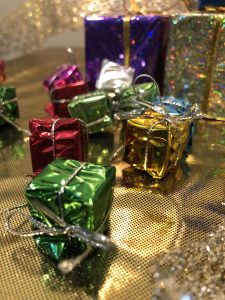
gifts of 2020
What things do you need to leave behind in 2020?
I’d like to leave behind my desire to fix things… especially those things I cannot control.
I’d like to leave behind my anger and frustration at people I cannot change.
What gifts do you want to bring with you into 2021?
That I don’t have to be as busy as I think I do. I’d like to help other people see the creativity they can have online even when you cannot meet in person.
A gift I want to give to myself and to all of us in 2021 is the The Gift of Compassion and Attention.
Actually, I want us to imagine three gifts, like the three gifts of the Magi.
Let’s open each one and really receive them in 2021.
First Gift:
I want us each to open the gift of compassion for ourselves.
Let’s be honest, we have had a hard year.
We have gone through a lot, on so many levels.
Let’s give ourselves the gift of compassion that where we are is totally OK.
We don’t have to be different, better, or farther along.
Let us truly receive the gift of compassion for ourselves.
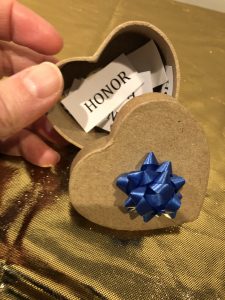
Compassion for ourselves
Second Gift:
Let’s open the gift of attention.
What does taking care of ourselves look like in 2021?
We give attention to our work, our homes, our friends and family, but what does it look like to give attention to ourselves?
Giving ourselves the attention we need and deserve just like we’d give a favorite friend or a child.
We need to give ourselves that attention and care, so we can heal
and so we can have margin to give to others.
What does this gift of attention look like for you?
Take some time to reflect on this.
Is it a ritual of a walk each day, a bubble bath, or a nap? Is it time to create something or making a phone/zoom date with a friend?
Actually put it on your list and/on your calendar!

Gift of Attention
Now open the Third box… the gift of attention and compassion for others.
I really want to give this gift to our world!
I want everyone to pay attention to one another in 2021.
Really look and really see
see each other…
not just the person or people who live in your house or my house,
But the people in our neighborhoods, on your street, in your town or city.
Who are they?
What are their lives really like?
How are their lives different or the same because of 2020?
Actually take the time to consider this and walk a bit in their shoes.
These people matter to God.
These people reflect God’s image.
Our Actions or In-actions truly do affect their lives.
How can we open the Gift of Compassion and attention in 2021?
Let’s pray and ask God to give us eyes to see and ears to hear the needs of those around us!

Gift of Compassion for Others
©lillylewin and freerangeworship.com
The Moon’s journey across the sky from the darkness of the New Moon to the light of the Full Moon has taught me a lot about life’s journey during these “interesting” times. This picture was taken from the back deck of our house in Georgia.
2020 has been an unusual year to say the least. The COVID-19 worldwide Pandemic has changed the way we live, work, recreate, rest, and worship. When we rang in the new year, we had no idea what was in store for us. As a pastor, switching gears from typical worship services to Zoom worship was a huge challenge. Many of my colleagues joked how they never taught us how to construct this sort of worship in seminary. Of course, when I was in seminary, the internet wasn’t available, and I was typing my seminary papers on a manual typewriter!
As Advent approached, I was uncertain what it would look like. My wife and I, along with our puppy, had moved from Colorado to Georgia in the midst of the pandemic so that I could take a new call. Initially, we thought we might be able to have small, 30-minute worship gatherings with a small number of people in the sanctuary and the rest seeing it via stream on our website. However, as we watched the pandemic numbers skyrocket nationwide as well as in our new state and county, the decision was made to continue streaming worship. It was weird to be recording my portions of worship on a Wednesday for broadcast on the following Sunday. Literally, it was hard to remember what week of Advent we were in!
In the midst of all the strangeness of this season, I worked to find the light shining and to recall wonders I saw around me. Today as I am writing (December 21st, Winter Solstice) the clouds have cleared off and the sun is shining. This morning when I awoke and then headed to work, it was gloomy and overcast. I struggled to see the light in the midst of the gloominess. The light first appeared in a non-typical way. A man had stopped by the church and needed help with rent. He asked for three days to take him up to Christmas Day when he would get paid. The motel’s office was closed on Christmas Day, so he didn’t know how to pay for the next week. Using the pastor’s discretionary fund, I was able to pay for another week at the motel. Times have been tough and when you live from paycheck to paycheck, one surprise bill can throw you off completely. As we chatted outside afterwards, I could see a new light in his eyes. I couldn’t see his mouth through the mask he wore, but I definitely saw a light shining that hadn’t been there before. This Christmas, he wouldn’t be on the streets. As we left, we wished each other a Merry Christmas. Later in the morning, the sun came out. The two of us leaned towards the light without knowing it. The simple act of assisting with his rent and then talking together afterwards was the light that shone in the darkness.
In his book, Raids on the Unspeakable, Thomas Merton offered this reflection on there being no room at the inn when Jesus was born.
Into this world, this demented inn, in which there is absolutely no room for Him at all, Christ has come uninvited. But because He cannot be at home in it, because He is out of place in it, and yet He must be in it, His place is with those others for whom there is no room. His place is with those who do not belong, who are rejected by power because they are regarded as weak, those who are discredited, who are denied the status of persons… With those for whom there is no room, Christ is present in this world. He is mysteriously present in those for whom there seems to be nothing but the world at its worst. (pp. 72-73)
Part of leaning towards the light is being open to the possibility of meeting Christ in the face of a stranger, of one who lives hidden on the margins. Years ago, I met Jesus in a homeless camp; his name was James. Today, I met Jesus again outside a motel. His name was Arvel. Where will you meet Jesus as you lean towards the light? Blessings on your journey as we move forward into the new year.
Check out another post for this morning: A Guaranteed Way To Make 2021 Better by Donna Chacko
Note: As an Amazon Affiliate, I earn an amount on qualifying purchases. Thank you for your support for Godspace in this way.
by Donna Chacko
On this last day of what has been a torturous 2020, let each of us ask: how we can make 2021 better for ourselves and others? I’m convinced that taking the time to ask and answer this question is the first step toward achieving the goal—and, New Year’s Eve is the perfect time to do this.
Cultivating gratitude is one of the most powerful things you can do to make 2021 better. Intentionally shine a bright light of gratitude on your life and then look around. Do you see some blessings that you take for granted? This might be big things like your faith, your family, or your health. Or it could be little blessings of every day life, like your morning coffee, a comfortable chair, a special song, or a baby’s giggle. During this year of altered routines, I noticed I was surprisingly grateful for little things, like my rose blooms or the black Labrador puppy next door. Amidst all the loss, pain, and division, there is always something to be grateful for—even if the one thing is your God who never wavers.
Finding blessings is probably more challenging for those of you who are grieving or overwhelmed with job loss, unbearable financial insecurity, or sickness. I pray every day for your well-being and hope that others who are both blessed and grateful will share their blessings with you. In the meantime, please try to draw close to God for comfort and guidance.

https://pixabay.com/photos/sax-player-jazz-new-york-music-776800/
When the renowned 20th century saxophonist, John Coltrane, shone the light of gratitude on his life, something sacred and mysterious happened. The words of a gratitude prayer sprung from his mind, but the expression of this prayer flowed from his saxophone. He played his prayer, one holy note at a time, in the song Psalm, part of his 1965 album, Love Supreme. Psalm is Coltrane’s heartfelt declaration of faith and gratitude to God after his long struggle with addiction. Coltrane wrote the words to his prayer on a piece of paper, placed that paper on his music stand, picked up his saxophone, and spontaneously played the words on his instrument. It ends with: “Thank you God. Elation. Elegance. Exaltation. All from God. Thank you God. Amen.”
I encourage you to prayerfully listen to Coltrane’s soulful music while simultaneously scrolling through his handwritten lines of prayer. When I did this, I was moved to tears. Through his timeless music, Coltrane shines his gratitude on all who ever listen to his song. He most definitely is letting his light shine in a way that can illumine a better path for us in 2021.
Our world really needs all of us to let our lights shine. Recharge your batteries with prayer. Then reflect on and express your gratitude for what is good and beautiful in your life, no matter how small. Your gratitude will shine a much needed light on our hurting world. You may not reach as many people as Coltrane with the light of your gratitude, but you will feel better and so will those around you. It is a gift that keeps on giving.
“Feeling gratitude and not expressing it is like wrapping a present and not giving it.”
William Arthur Ward
Happy New Year to the Godspace family and special thanks to Christine Sine and her staff. It is a privilege to write in this space. To see more of what I write about health and faith and to receive “Three Keys to a Holy, Happy and Health Life, go to serenityandhealth.com/subscribe.
God bless each of you.
Donna
As an Amazon Associate, I receive a small amount for purchases made through appropriate links.
Thank you for supporting Godspace in this way.
When referencing or quoting Godspace Light, please be sure to include the Author (Christine Sine unless otherwise noted), the Title of the article or resource, the Source link where appropriate, and ©Godspacelight.com. Thank you!

